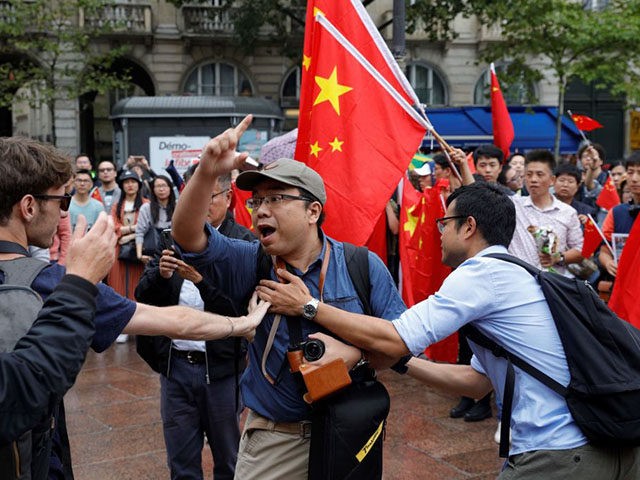America’s mission to the United Nations revealed on Wednesday it had requested a Security Council meeting to discuss China’s unlawful takeover of “national security” in Hong Kong, but as China is one of the most powerful members on the council, it blocked the meeting.
China is one of five permanent members of the council, also including the United States, Russia, France, and the United Kingdom. According to the U.S. mission, China single-handedly prevented discussion of the increasingly worrisome situation in Hong Kong where, as of Wednesday Chinese Communist Party authorities will be able to punish people present in the nominally autonomous region for any behavior they identify as threatening the national security of China.
The “national security” law China’s National People’s Congress (NPC) passed on Thursday overrides the autonomy of the Hong Kong authorities to handle local criminal concerns. Its opponents note that it is a violation of “One Country, Two Systems,” the policy China vowed to keep to when Hong Kong accepted Chinese sovereignty over it in 1997.
The U.S. mission to the U.N. called the law a “matter of urgent global concern that implicates international peace and security.”
“As a result, the United States called today for a virtual meeting of the Security Council to discuss these acts and the PRC’s [China’s] proposed national security law that would threaten Hong Kong’s democratic institutions and civil liberties. Such actions confirm the PRC’s contempt and complete disregard for its international obligations,” the mission said. “Unsurprisingly, the PRC has refused to allow this virtual meeting to proceed in the Security Council.”
“This is another example of the Chinese Communist Party’s fear of transparency and international accountability for its actions, and belief that it can exploit the current global health pandemic to distract the world from its intended assault on Hong Kong and abrogation of its own commitments to the Hong Kong people,” the mission asserted.
The American diplomats compared China’s moves to block an international discussion of the law to its “gross cover-up and mismanagement of the COVID-19 [Chinese coronavirus] crisis, its constant violations of its international human rights commitments, and its unlawful behavior in the South China Sea.”
The statement concluded that China is not a “responsible” party to the United Nations.
China’s ambassador to the U.N., Zhang Jun, confirmed that he blocked the proposed meeting on Twitter, declaring Washington “the trouble maker [sic] of the world.”
Facts prove again and again that the US is the trouble maker of the world.
It is the US who has violated its commitments under the international law.
China urges the US to immediately stop its power politics and bullying practices.
— Zhang Jun (@ChinaAmbUN) May 28, 2020
As France 24 noted, the Chinese coronavirus pandemic has made in-person Security Council meetings impossible, so new protocol exists to organize virtual meetings. All 15 members of the Council must agree to meet for the event to go forward, so China’s disagreement was enough to prevent the other 14 from officially holding a session.
Normally, “a meeting can only be contested if a member convinces eight others to join the protest in a procedural vote.”
The NPC’s “national security” law is designed to criminalize peaceful protests, which have been ongoing nearly incessantly for the past year in Hong Kong, save for a short hiatus during the time Hong Kong officials limited public gatherings in response to the pandemic. Hong Kong’s pro-democracy protesters began taking action last year in the face of a proposed law at the local level that would have allowed the Chinese government to extradite anyone present in Hong Kong if accused of violating China’s repressive communist laws. That law failed in Hong Kong’s Legislative Council, which led to Beijing declaring Hong Kong’s government incompetent to preserve China’s security.
The NPC law will function similarly to the failed extradition law, except it allows China to act against suspected criminals only in cases of crimes like threats to national security, “secession,” or “treason.” As the NPC passes laws before they are written, it is not yet clear which specific crimes will be included or how they will be defined.
It is also not clear if China will give itself extradition power or merely the ability to send Chinese agents into Hong Kong and arrest people there.
China’s Global Times propaganda outlet declared the law a victory in the fight against American influence on perceptions of human rights in Hong Kong.
After the national security law for Hong Kong is passed, the US ability to directly interfere in Hong Kong’s situation will be greatly reduced,” the newspaper celebrated on Thursday. “Hong Kong’s future prosperity will be shaped by Hong Kong people themselves, with the help of the whole country.”
The Global Times objected to Secretary of State Mike Pompeo certifying on Wednesday that, due to illegal Beijing intrusions, Hong Kong is no longer in practice autonomous from China.
“The U.S. regards Hong Kong as a pawn to confront the Chinese mainland [China’s term for the territory it claims legally]. It has become obvious that once the U.S. fails to take advantage of Hong Kong, it will treat Hong Kong people as enemies,” the Times predicted. “The more sanctions the U.S. imposes on Hong Kong, the more Hongkongers’ interests will be tied to the whole country.”
Pompeo’s statement does not sanction Hong Kong.

COMMENTS
Please let us know if you're having issues with commenting.